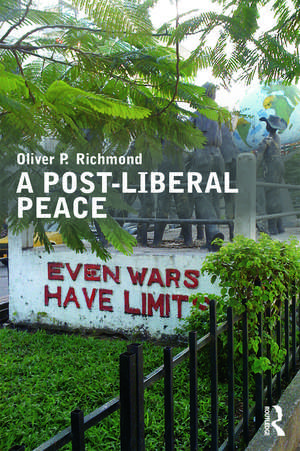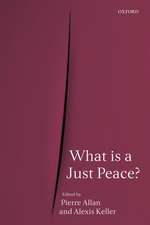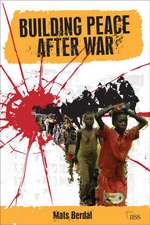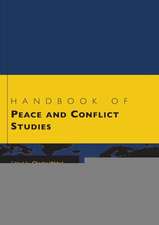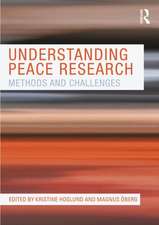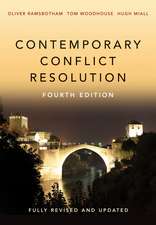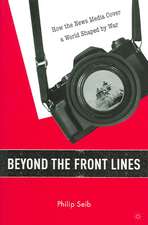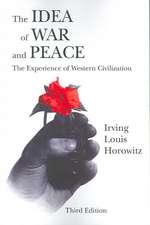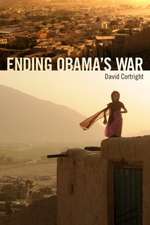A Post-Liberal Peace: Routledge Studies in Peace and Conflict Resolution
Autor Oliver Richmonden Limba Engleză Paperback – 14 iun 2011
Liberal peacebuilding has caused a range of unintended consequences. These emerge from the liberal peace’s internal contradictions, from its claim to offer a universal normative and epistemological basis for peace, and to offer a technology and process which can be applied to achieve it. When viewed from a range of contextual and local perspectives, these top-down and distant processes often appear to represent power rather than humanitarianism or emancipation. Yet, the liberal peace also offers a civil peace and emancipation. These tensions enable a range of hitherto little understood local and contextual peacebuilding agencies to emerge, which renegotiate both the local context and the liberal peace framework, leading to a local-liberal hybrid form of peace. This might be called a post-liberal peace. Such processes are examined in this book in a range of different cases of peacebuilding and statebuilding since the end of the Cold War.
This book will be of interest to students of peacebuilding, peacekeeping, peace and conflict studies, international organisations and IR/Security Studies.
| Toate formatele și edițiile | Preț | Express |
|---|---|---|
| Paperback (1) | 419.50 lei 43-57 zile | |
| Taylor & Francis – 14 iun 2011 | 419.50 lei 43-57 zile | |
| Hardback (1) | 1059.18 lei 43-57 zile | |
| Taylor & Francis – 14 iun 2011 | 1059.18 lei 43-57 zile |
Din seria Routledge Studies in Peace and Conflict Resolution
-
 Preț: 314.01 lei
Preț: 314.01 lei -
 Preț: 296.65 lei
Preț: 296.65 lei -
 Preț: 137.59 lei
Preț: 137.59 lei -
 Preț: 301.63 lei
Preț: 301.63 lei -
 Preț: 324.91 lei
Preț: 324.91 lei -
 Preț: 231.06 lei
Preț: 231.06 lei -
 Preț: 466.45 lei
Preț: 466.45 lei - 25%
 Preț: 323.04 lei
Preț: 323.04 lei - 18%
 Preț: 1053.92 lei
Preț: 1053.92 lei -
 Preț: 385.54 lei
Preț: 385.54 lei - 18%
 Preț: 1117.43 lei
Preț: 1117.43 lei - 28%
 Preț: 821.82 lei
Preț: 821.82 lei - 18%
 Preț: 1165.73 lei
Preț: 1165.73 lei - 16%
 Preț: 337.39 lei
Preț: 337.39 lei - 18%
 Preț: 1168.37 lei
Preț: 1168.37 lei - 18%
 Preț: 1114.08 lei
Preț: 1114.08 lei - 18%
 Preț: 705.53 lei
Preț: 705.53 lei - 28%
 Preț: 822.34 lei
Preț: 822.34 lei - 18%
 Preț: 1049.36 lei
Preț: 1049.36 lei - 18%
 Preț: 1054.71 lei
Preț: 1054.71 lei - 18%
 Preț: 999.98 lei
Preț: 999.98 lei -
 Preț: 390.37 lei
Preț: 390.37 lei - 25%
 Preț: 853.43 lei
Preț: 853.43 lei - 30%
 Preț: 847.86 lei
Preț: 847.86 lei -
 Preț: 411.42 lei
Preț: 411.42 lei -
 Preț: 412.37 lei
Preț: 412.37 lei - 49%
 Preț: 543.52 lei
Preț: 543.52 lei - 17%
 Preț: 296.21 lei
Preț: 296.21 lei - 16%
 Preț: 299.52 lei
Preț: 299.52 lei - 28%
 Preț: 824.70 lei
Preț: 824.70 lei -
 Preț: 485.84 lei
Preț: 485.84 lei - 13%
 Preț: 295.49 lei
Preț: 295.49 lei - 18%
 Preț: 1166.80 lei
Preț: 1166.80 lei -
 Preț: 406.05 lei
Preț: 406.05 lei - 18%
 Preț: 1111.51 lei
Preț: 1111.51 lei - 18%
 Preț: 1164.44 lei
Preț: 1164.44 lei - 18%
 Preț: 1060.87 lei
Preț: 1060.87 lei -
 Preț: 381.00 lei
Preț: 381.00 lei - 28%
 Preț: 822.01 lei
Preț: 822.01 lei - 28%
 Preț: 848.22 lei
Preț: 848.22 lei
Preț: 419.50 lei
Nou
Puncte Express: 629
Preț estimativ în valută:
80.30€ • 87.25$ • 67.49£
80.30€ • 87.25$ • 67.49£
Carte tipărită la comandă
Livrare economică 21 aprilie-05 mai
Preluare comenzi: 021 569.72.76
Specificații
ISBN-13: 9780415667845
ISBN-10: 0415667844
Pagini: 288
Ilustrații: 2 black & white tables, 6 black & white line drawings
Dimensiuni: 156 x 234 x 15 mm
Greutate: 0.53 kg
Ediția:New.
Editura: Taylor & Francis
Colecția Routledge
Seria Routledge Studies in Peace and Conflict Resolution
Locul publicării:Oxford, United Kingdom
ISBN-10: 0415667844
Pagini: 288
Ilustrații: 2 black & white tables, 6 black & white line drawings
Dimensiuni: 156 x 234 x 15 mm
Greutate: 0.53 kg
Ediția:New.
Editura: Taylor & Francis
Colecția Routledge
Seria Routledge Studies in Peace and Conflict Resolution
Locul publicării:Oxford, United Kingdom
Public țintă
Postgraduate, Professional, and UndergraduateCuprins
Introduction Part 1: The Romanticisation of the Local 1. Civil Society, Needs, Welfare 2. The Culture of Liberal Peacebuilding 3. Critical Perspectives of Liberal Peacebuilding: Cambodia, Bosnia Herzegovina, Kosovo, and Timor Leste 4. De-Romanticising the Local: Implications for Post-Liberal Peacebuilding Part 2: Hybridity and The Infrapolitics of Peace 5. Everyday Critical Agency and Resistance in Peacebuilding 6. De-romanticising the Local, De-Mystifying the International: Aspects of the Local-Liberal Hybrid. Conclusion: The Birth of A Post-Liberal Peace
Notă biografică
Oliver P. Richmond is a Professor in the School of International Relations, University of St. Andrews, UK, and Director of the Centre for Peace and Conflict Studies. His publications include The Transformation of Peace (2005), Peace in International Relations (Routledge, 2008) and Liberal Peace Transitions (with Jason Franks, 2009).
Recenzii
'Much of the credit for the seismic shift in reconceptualising peace and peacebuilding must go to Oliver Richmond. His latest book answers, head-on, the anti-political fatalism that there is no alternative to a liberal peace.' - Michael Pugh, University of Bradford, UK
‘Oliver Richmond's work is in the best tradition of critical scholarship: challenging comfortable assumptions, revealing internal contradictions, but also speaking to concrete policy.' - Simon Chesterman, NYU School of Law Singapore Programme, USA
‘The liberal nature of post-conflict reconstruction has become a much discussed topic. Oliver Richmond is among the most authoritative contributors to the respective debates, pointing towards the dangers of a top-down, state-centric and market-driven approach. A Post-Liberal Peace offers his most comprehensive and impressive take so far. He convincingly illumines, in particular, how local practices of resistance can contribute to what he calls a post-liberal peace: a hybrid arrangement that allows local actors to make reconstruction more sustainable than it could ever be through a mere external imposition of liberal institutions and procedures.' - Roland Bleiker, University of Queensland, Australia
'...well-researched and theoretically sound...Highly recommended.' -- CHOICE
‘Oliver Richmond's work is in the best tradition of critical scholarship: challenging comfortable assumptions, revealing internal contradictions, but also speaking to concrete policy.' - Simon Chesterman, NYU School of Law Singapore Programme, USA
‘The liberal nature of post-conflict reconstruction has become a much discussed topic. Oliver Richmond is among the most authoritative contributors to the respective debates, pointing towards the dangers of a top-down, state-centric and market-driven approach. A Post-Liberal Peace offers his most comprehensive and impressive take so far. He convincingly illumines, in particular, how local practices of resistance can contribute to what he calls a post-liberal peace: a hybrid arrangement that allows local actors to make reconstruction more sustainable than it could ever be through a mere external imposition of liberal institutions and procedures.' - Roland Bleiker, University of Queensland, Australia
'...well-researched and theoretically sound...Highly recommended.' -- CHOICE
Descriere
This book examines how the liberal peace experiment of the post-Cold War environment has failed to connect with its target populations, which have instead set about transforming it according to their own local requirements.
